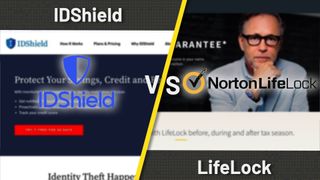IDShield vs LifeLock
We compare IDShield vs LifeLock to see which identity theft protection service is best for keeping you safe

If you buy things online, post to social media, or even file your taxes over the internet, you could be vulnerable to identity theft. Even users who are careful to only share their data on secure, trusted websites could be victims of data breaches undertaken by cybercriminals eager to max out your credit cards, or make fraudulent purchases in your name.
That’s why having the best identity theft protection service is essential for anyone who shares information online. In this article, we’ll compare two options for identity theft protection: IDShield vs LifeLock. We’ll look at their features, performance, support, and cost to help you find the best identity theft protection.
Features
Both IDShield and LifeLock come with the basic features you will need to monitor your information online: social security number monitoring, dark web monitoring, and alerts if there are unusual changes to your credit reports or bank accounts. Both even offer lost wallet assistance, helping you change or cancel your credit cards in case of a stolen or misplaced wallet.
IDShield users can choose between one-bureau credit monitoring or the more comprehensive three-bureau credit monitoring, whereas most LifeLock plans only offer one-bureau monitoring. IDShield comes with a few bonus features that LifeLock is missing, like social media scanning and reputation management. If you’re job hunting and want to ensure you’re making the best digital first impression possible, this is a useful tool.
LifeLock is part of Norton AntiVirus, a familiar and trusted name in antivirus protection. That means that with most levels of LifeLock, you’ll also have access to the scanning, privacy, and anti-malware services of Norton 360. Since one way cybercriminals can access your private information is through malware attacks, the added protection of Norton 360 is a huge benefit of LifeLock.
Another crucial benefit of the best identity theft protection services are the features and assistance they provide if you are the victim of identity theft. One unique feature offered by IDShield is access to in-house licensed private investigators to assist you in restoring your identity.
IDShield also offers unlimited consultations with identity theft specialists who can answer all your questions. Plus, every IDShield plan comes with $1 million in protection to cover stolen funds, legal fees, and other expenses. Only the most expensive level of LifeLock, LifeLock Ultimate Plus, matches IDShield’s stolen fund reimbursement.
The lower levels of LifeLock only offer between $25,000 and $100,000 of stolen fund reimbursement—but LifeLock also offers up to $1 million of coverage for lawyers and experts at all levels.
Overall, the core components of IDShield and LifeLock are pretty comparable, with IDShield offering a few more extras that may or may not be relevant to you. To us, however, IDShield’s handful of extras don’t compare to the security advantages of bundling LifeLock with Norton 360.
Performance
LifeLock is easy to set up, requiring answers to a few simple questions, a valid ID, and a credit card.
Once purchased, LifeLock users can either log on to their account via LifeLock’s website, or download the LifeLock mobile app for iOS or Android. With the LifeLock mobile app, you’ll receive alerts of fraudulent activity on your mobile device, enabling you to take action right away to protect your accounts.
Like LifeLock, IDShield also offers users the ability to log in to their account either from the web or on the go with an iOS or Android app. When you log in, your most recent credit score is front and center, as well as any new alerts that you may need to review.
If space on your phone is at a premium, you might want to go with IDShield, as the app takes up on only 29MB of space on an iPhone versus LifeLock’s 82MB. However, both apps and web interfaces are intuitive and easy-to-use. When it comes to performance, both LifeLock and IDShield offer comparable experiences.
Support
You never know when an attack on your identity may occur, and a key component of identity theft protection is knowing someone will be available to assist you, day or night.
LifeLock offers 24/7 support to its members, with priority support offered to Ultimate Plus members. In the event of identity theft, LifeLock also offers its members access to identity restoration specialists. Additionally, the LifeLock app features an in-app calling service connecting you to LifeLock Member Services, meaning if you do encounter an issue, help is right at your fingertips.
IDShield also offers 24/7 access to customer service. Like LifeLock, IDShield has identity restoration services for its members. IDShield offers a few extras when it comes to support, like the in-house private investigators and unlimited consulting mentioned above.
IDShield also makes it easy to contact their user support directly through their app, with a prominently-placed, hard-to-miss green button. Overall, IDShield and LifeLock both offer comprehensive, easy-to-access support for their members.
Pricing and plans
IDShield offers an Individual plan and a Family plan. With both options, users have the ability to select either one-bureau or three-bureau credit monitoring—meaning there are four total levels of plans.
IDShield’s Individual plan will cost you $13.95 a month for one-bureau credit monitoring, or $17.95 a month for three-bureau. The Individual plan only covers one person. The Family plan, however, covers one individual, a spouse or domestic partner, and up to 10 dependent children.
The Family plan is $26.95 monthly for one-bureau credit monitoring, or $32.95 a month for three-bureau credit monitoring. IDShield also offers users a free 30-day trial, so you can see if you like the service before committing.
LifeLock’s plans and pricing are a bit more confusing, offering four levels of support depending on your needs. The most basic, the Standard plan, includes just LifeLock’s monitoring services without Norton 360. The Standard plan costs $9.99 a month for your first year, or $8.29 a month if you choose to bill annually.
LifeLock Select includes Norton 360 for up to five devices at the same price as the Standard plan (all of LifeLock’s prices increase after the first year.) Both of these plans offer up to $25,000 of stolen fund reimbursement.
LifeLock customers looking for more stolen fund reimbursement might also want to opt for the LifeLock Advantage Plan, which offers up to $100,000 and Norton 360 protection for up to 10 devices. The Advantage Plan is $17.99 a month for your first year, or $14.99 a month billed annually.
The most comprehensive LifeLock plan is LifeLock Ultimate Plus, offering three-bureau credit monitoring, up to $1 million in stolen fund reimbursement, and Norton 360 protection for unlimited devices. LifeLock Ultimate Plus is $25.99 a month for the first year, or $20.99 a month if billed annually.
When it comes to pricing and plans, it’s nice that LifeLock offers a discount to users who pay annually, and a discount for your first year. But the 30-day free trial of IDShield is hard to beat.
Verdict
Ultimately, we think the extras IDShield provides - like social media monitoring - simply don’t stack up to the added benefits of bundling LifeLock with Norton 360. The most basic LifeLock with Norton 360 package, LifeLock Select, is cheaper for an individual than IDShield for the first year, and not significantly more expensive after.
For us, LifeLock is the superior choice for greater peace of mind when protecting your identity online. If you want more details, please read our LifeLock review.
Get the ITPro. daily newsletter
Receive our latest news, industry updates, featured resources and more. Sign up today to receive our FREE report on AI cyber crime & security - newly updated for 2024.
Sarah James is a freelance writer in Los Angeles. She has written about creativity, culture, and technology for brands like TechRadar, Submittable Content For Creatives, The Billfold, Pittsburgh City Paper, The Toast, and more.





